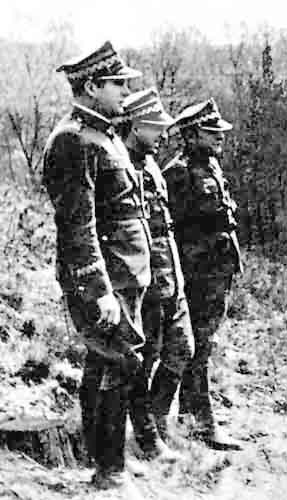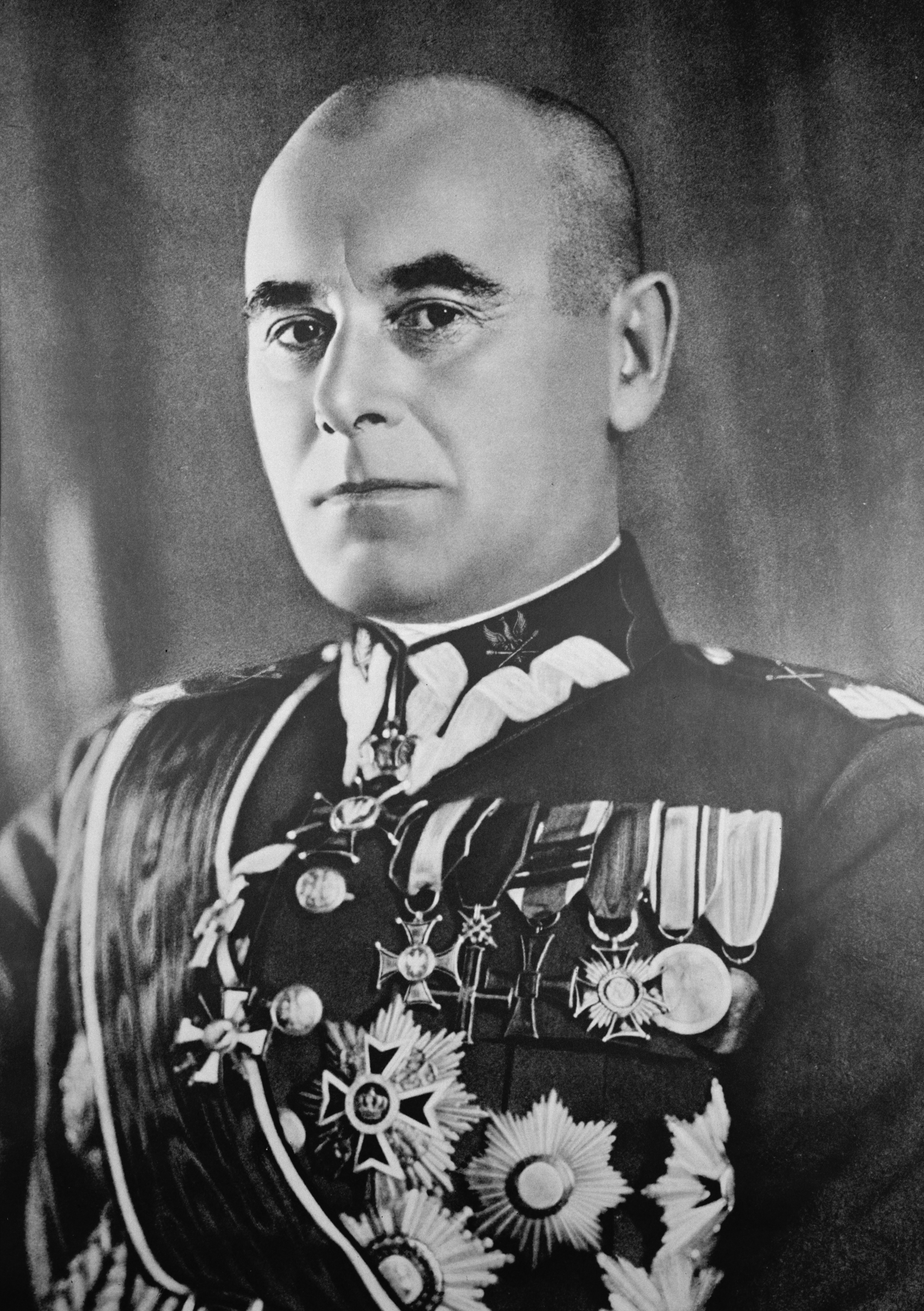|
Michał Rola-Żymierski
Michał Rola-Żymierski (; 4 September 189015 October 1989) was a Polish high-ranking Polish United Workers' Party, Communist Party leader, communist military commander and NKVD secret agent. He was appointed as Marshal of Poland, and served in this position from 1945 until his death. Early life Rola-Żymierski was born Michał Łyżwiński in Kraków under the Austrian Partition, to the family of railway clerk, Wojciech Łyżwiński. He joined the Zarzewie and later joined the Polish Rifle Squads. At the age of 20, he enrolled at the law faculty of the Jagiellonian University in 1910, but was drafted a year later. In the years 1911–1912, he served compulsory service in the Austro-Hungarian Army, where he graduated from the school of reserve officers. After his brother committed a widely publicised murder-robbery in Kraków, he began to call himself ''Żymierski'' around 1913. Military career World War I When World War I erupted in 1914, he joined the Polish Legions in World ... [...More Info...] [...Related Items...] OR: [Wikipedia] [Google] [Baidu] |
Marshal Of Poland
Marshal of Poland () is the highest rank in the Polish Army. It has been granted to only six officers. At present, Marshal is equivalent to a field marshal or general of the army (OF-10) in other NATO armies. History Today there are no living Marshals of Poland, since this rank is bestowed only on military commanders who have achieved victory in war. Recently, however, the rank of four-star with the modernised name ''Generał'' has been introduced, and on August 15, 2002, was granted to Czesław Piątas, at present civilian, former Chief of the General Staff of the Polish Armed Forces. List of Marshals In all, the following people have served as Marshals of Poland Poland, officially the Republic of Poland, is a country in Central Europe. It extends from the Baltic Sea in the north to the Sudetes and Carpathian Mountains in the south, bordered by Lithuania and Russia to the northeast, Belarus and Ukrai .... References {{DEFAULTSORT:Marshal Of Poland Military r ... [...More Info...] [...Related Items...] OR: [Wikipedia] [Google] [Baidu] |
Polish Armed Forces (Second Polish Republic)
Polish Armed Forces () were the armed forces of the Second Polish Republic from 1919 until the demise of independent Poland at the onset of Second World War in September 1939. History The outbreak of First World War meant that a huge number of Poles from the lands of the Polish partitions were forced to stand as soldiers in the ranks of German, Russian and Austro-Hungarian armies.In addition to these troops, Polish volunteer units were formed to fight either on the side of the coalition or central states. A branch of 'Bajonians' was established in France and in Poland by Witold Ostoja-Gorczyński ( Legion of Puławy). However, these were small units. The first ceased to exist due to losses, and the second could not grow due to political considerations. The Polish Legions were the greater union of the Polish Army of the independent Polish–Lithuanian Commonwealth. They were created in 1914 by brigadier Józef Piłsudski. The members of these formations were members of underg ... [...More Info...] [...Related Items...] OR: [Wikipedia] [Google] [Baidu] |
Zarzewie
Organisation of Independent Youth Zarzewie was a clandestine Polish youth organization, formed in May 1909 in Lemberg, Austrian Galicia. Based on Association of the Polish Youth "Zet", its objective was the restoration of independent Poland. As part of ''Polish Military Union'' (''Polski Zwiazek Wojskowy''), Zarzewie trained recruits for the future Polish Army. From March until May 1911, Zarzewie, with support of scouting instructor and physician Kazimierz Wyrzykowski, carried out first training course, with emphasis both on physical education and political training (with lectures by Eugeniusz Romer). Meanwhile, Zarzewie formed first cells in Russian-controlled Congress Poland and the Kingdom of Prussia. During World War I, most members of the organization joined Polish Legions in World War I. Zarzewie was dissolved in February 1920. See also * Secret society Sources * Garlicka, Aleksandra (red.), Zarzewie 1909-1920 – Wspomnienia i materiały, Instytut Wydawniczy PAX, ... [...More Info...] [...Related Items...] OR: [Wikipedia] [Google] [Baidu] |
Secret Agent
Espionage, spying, or intelligence gathering, as a subfield of the intelligence field, is the act of obtaining secret or confidential information (intelligence). A person who commits espionage on a mission-specific contract is called an ''espionage agent'' or ''spy''. A person who commits espionage as a fully employed officer of a government is called an intelligence officer. Any individual or spy ring (a cooperating group of spies), in the service of a government, company, criminal organization, or independent operation, can commit espionage. The practice is clandestine, as it is by definition unwelcome. In some circumstances, it may be a legal tool of law enforcement and in others, it may be illegal and punishable by law. Espionage is often part of an institutional effort by a government or commercial concern. However, the term tends to be associated with state spying on potential or actual enemies for military purposes. Spying involving corporations is known as corpora ... [...More Info...] [...Related Items...] OR: [Wikipedia] [Google] [Baidu] |
NKVD
The People's Commissariat for Internal Affairs (, ), abbreviated as NKVD (; ), was the interior ministry and secret police of the Soviet Union from 1934 to 1946. The agency was formed to succeed the Joint State Political Directorate (OGPU) secret police organization, and thus had a monopoly on intelligence and state security functions. The NKVD is known for carrying out political repression and the Great Purge under Joseph Stalin, as well as counterintelligence and other operations on the Eastern Front of World War II. The head of the NKVD was Genrikh Yagoda from 1934 to 1936, Nikolai Yezhov from 1936 to 1938, Lavrentiy Beria from 1938 to 1946, and Sergei Kruglov in 1946. First established in 1917 as the NKVD of the Russian SFSR, the ministry was tasked with regular police work and overseeing the country's prisons and labor camps. It was disbanded in 1930, and its functions dispersed among other agencies before being reinstated as a commissariat of the Soviet Union ... [...More Info...] [...Related Items...] OR: [Wikipedia] [Google] [Baidu] |
World War II
World War II or the Second World War (1 September 1939 – 2 September 1945) was a World war, global conflict between two coalitions: the Allies of World War II, Allies and the Axis powers. World War II by country, Nearly all of the world's countries participated, with many nations mobilising all resources in pursuit of total war. Tanks in World War II, Tanks and Air warfare of World War II, aircraft played major roles, enabling the strategic bombing of cities and delivery of the Atomic bombings of Hiroshima and Nagasaki, first and only nuclear weapons ever used in war. World War II is the List of wars by death toll, deadliest conflict in history, causing World War II casualties, the death of 70 to 85 million people, more than half of whom were civilians. Millions died in genocides, including the Holocaust, and by massacres, starvation, and disease. After the Allied victory, Allied-occupied Germany, Germany, Allied-occupied Austria, Austria, Occupation of Japan, Japan, a ... [...More Info...] [...Related Items...] OR: [Wikipedia] [Google] [Baidu] |
May Coup (Poland)
The May Coup ( or ) was a coup d'état carried out in Poland by Marshal Józef Piłsudski from 12 to 14 May 1926. The attack of Piłsudski's supporters on government forces resulted in the overthrow of the democratically-elected government of President Stanisław Wojciechowski and Prime Minister Wincenty Witos and caused hundreds of fatalities. A new government was installed, headed by Kazimierz Bartel. Ignacy Mościcki became president. Piłsudski remained the dominant politician in Poland until his death in 1935. Background Józef Piłsudski, who controlled politics in the reestablished Polish state to a considerable degree, had lost his advantage in the aftermath of the failed Kiev offensive of spring 1920.Andrzej Chwalba, ''Przegrane zwycięstwo. Wojna polsko-bolszewicka 1918–1920'' he Lost Victory: Polish–Bolshevik War 1918–1920 Wydawnictwo Czarne, Wołowiec 2020, , p. 296. He retained high esteem in segments of the armed forces that originated from his ... [...More Info...] [...Related Items...] OR: [Wikipedia] [Google] [Baidu] |
World War I
World War I or the First World War (28 July 1914 – 11 November 1918), also known as the Great War, was a World war, global conflict between two coalitions: the Allies of World War I, Allies (or Entente) and the Central Powers. Fighting took place mainly in European theatre of World War I, Europe and the Middle Eastern theatre of World War I, Middle East, as well as in parts of African theatre of World War I, Africa and the Asian and Pacific theatre of World War I, Asia-Pacific, and in Europe was characterised by trench warfare; the widespread use of Artillery of World War I, artillery, machine guns, and Chemical weapons in World War I, chemical weapons (gas); and the introductions of Tanks in World War I, tanks and Aviation in World War I, aircraft. World War I was one of the List of wars by death toll, deadliest conflicts in history, resulting in an estimated World War I casualties, 10 million military dead and more than 20 million wounded, plus some 10 million civilian de ... [...More Info...] [...Related Items...] OR: [Wikipedia] [Google] [Baidu] |
Marszałek Polski
Marshal of Poland () is the highest rank in the Polish Army. It has been granted to only six officers. At present, Marshal is equivalent to a field marshal or general of the army (OF-10) in other NATO armies. History Today there are no living Marshals of Poland, since this rank is bestowed only on military commanders who have achieved victory in war. Recently, however, the rank of four-star with the modernised name ''Generał'' has been introduced, and on August 15, 2002, was granted to Czesław Piątas, at present civilian, former Chief of the General Staff of the Polish Armed Forces. List of Marshals In all, the following people have served as Marshals of Poland Poland, officially the Republic of Poland, is a country in Central Europe. It extends from the Baltic Sea in the north to the Sudetes and Carpathian Mountains in the south, bordered by Lithuania and Russia to the northeast, Belarus and Ukrai .... References {{DEFAULTSORT:Marshal Of Poland Military ran ... [...More Info...] [...Related Items...] OR: [Wikipedia] [Google] [Baidu] |
Polish People's Army
The Polish People's Army (, ; LWP) was the second formation of the Polish Armed Forces in the East during the latter stages of the Second World War (1943–1945), and subsequently the armed forces of the Polish communist state (1945–1989), which was formalized in 1952 as the Polish People's Republic. The creation of communist-led Polish armed forces that were outside the command of the Polish government-in-exile was allowed and facilitated by Soviet leader Joseph Stalin, following efforts made in the early 1940s by Soviet-based Polish exiles Wanda Wasilewska and Zygmunt Berling. Initially called the Polish Army in the USSR from 1943 to 1944, it became the Polish Troops and Armed Forces of the Republic of Poland from 1944 to 1952, and thereafter the Armed Forces of the Polish People's Republic. During these restructurings, the Polish military was increasingly integrated into Soviet military and command structures, becoming comparatively more distinct and independent in ... [...More Info...] [...Related Items...] OR: [Wikipedia] [Google] [Baidu] |






